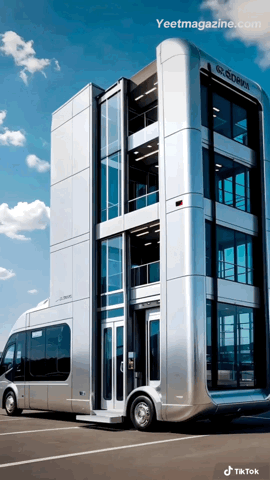Camping Cars : What If Folding RVs Could Change the Future of Travel?
Explore the concept of a futuristic folding RV that shrinks for city driving and expands into a spacious, multi-floor living space when parked. A game-changing design for travelers, adventurers, and minimalists. Learn more about how this innovative motorhome could revolutionize travel.

futuristic folding RV, compact RV, expandable camper, smart RV, collapsible motorhome, travel technology, solar-powered RV, eco-friendly RV, multi-floor RV, sustainable RV, RV design, camping car, portable home, futuristic vehicle, space-saving RV, smart travel solutions, off-grid travel, minimalist RV, eco-friendly camping, modular RV
What If Folding RVs Could Change the Future of Travel?
For years, traditional RVs have allowed travelers to explore while carrying the comforts of home. However, they come with challenges—parking in cities is difficult, fuel costs are high, and maneuvering large vehicles can be frustrating. Now, imagine a futuristic folding RV that remains compact while driving but expands into a spacious, multi-floor living space when parked.
Although such a vehicle does not yet exist, advancements in smart technology, lightweight materials, and sustainable energy suggest that it could soon become a reality. If engineers and designers could create a collapsible, self-expanding motorhome, it would revolutionize the way people travel.
What Would a Folding RV Look Like?
A folding RV, or expandable camping car, would be a vehicle designed to shrink in size for driving and expand for comfortable living. Using collapsible walls, retractable floors, and hidden compartments, this futuristic design could maximize space while maintaining ease of mobility.
While pop-up campers and slide-out motorhomes already exist, they still rely on manual setup and don’t fully collapse into a city-friendly compact size. A true futuristic folding RV would function more like a transforming smart home on wheels.
How Would a Folding RV Work?
1. A Compact Vehicle That Expands Into a Full-Size Home
The key to this design would be modular construction. While driving, the vehicle would remain small enough to fit into standard parking spaces and drive easily through narrow city streets. Once parked, it could expand both vertically and horizontally, revealing extra rooms and living areas.
Possible features could include:
- Retractable walls and ceilings that unfold to create a second or third floor.
- Expandable side panels that provide additional space for sleeping areas.
- Automated setup controlled via a smartphone app or voice command.
2. Smart Home Features for Comfort and Convenience
A futuristic folding RV would likely include advanced technology to make life on the road more comfortable:
- App-controlled lighting, temperature, and security.
- Automated furniture that adjusts to different layouts.
- Self-cleaning surfaces and air purification systems.
Imagine pressing a button, and your RV automatically expands, adjusts the lighting, and starts heating up your shower—all within minutes.
3. Sustainable and Energy-Efficient Design
Future RV designs would also need to be environmentally friendly. A folding RV could integrate:
- Solar panels for clean energy.
- Battery-powered systems to reduce fuel consumption.
- Aerodynamic design to improve fuel efficiency.
With climate change concerns growing, eco-friendly travel solutions will become more important. A solar-powered, self-sufficient folding RV would allow travelers to explore off-grid locations without harming the environment.
Who Would Benefit from a Folding RV?
1. City Travelers
Many people avoid traditional RVs because they are too large for urban environments. A compact, easy-to-park folding RV would allow travelers to drive through cities and park in standard spaces, making it an ideal option for digital nomads, business travelers, and urban explorers.
2. Adventure Seekers
Outdoor enthusiasts who love camping, hiking, skiing, or mountain biking could use a folding RV as a mobile base camp. Since it could be easily transported to remote locations but still provide a comfortable living space, it would offer the best of both worlds—adventure and luxury.
3. Minimalists and Tiny Home Enthusiasts
The tiny house movement has grown in popularity, with many people choosing to live in small, efficient spaces. A folding RV could take this concept further, offering a mobile, multi-functional home that adapts to different environments.
Could This Become a Reality?
While a fully automated folding RV does not exist yet, the technology needed to create one is already being developed. Some companies have experimented with:
- Self-expanding campers that unfold with the push of a button.
- Solar-powered RVs that operate without traditional fuel.
- Collapsible materials used in space exploration and architecture.
If these technologies are combined, a folding RV could become the future of travel, offering a compact, comfortable, and eco-friendly way to explore the world.
Final Thoughts
The idea of a folding RV may seem like science fiction today, but with the rapid advancements in engineering, AI, and sustainable energy, it could become reality in the near future.
Would you buy a folding RV if it were available? If so, what features would you want?
